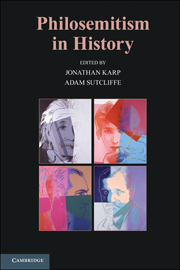Book contents
- Frontmatter
- Contents
- Notes on Contributors
- Introduction
- PART I MEDIEVAL AND EARLY MODERN FRAMEWORKS
- PART II THREE EUROPEAN PHILOSEMITES
- 4 William Whiston's Judeo-Christianity
- 5 A Friend of the Jews?
- 6 Ordinary People, Ordinary Jews
- PART III THE CULTURAL POLITICS OF PHILOSEMITISM IN VICTORIAN BRITAIN AND IMPERIAL GERMANY
- PART IV AMERICAN PHILOSEMITISMS
- PART V PHILOSEMITISM IN POST-HOLOCAUST EUROPE
- Index
- References
5 - A Friend of the Jews?
The Abbé Grégoire and Philosemitism in Revolutionary France
Published online by Cambridge University Press: 05 June 2012
- Frontmatter
- Contents
- Notes on Contributors
- Introduction
- PART I MEDIEVAL AND EARLY MODERN FRAMEWORKS
- PART II THREE EUROPEAN PHILOSEMITES
- 4 William Whiston's Judeo-Christianity
- 5 A Friend of the Jews?
- 6 Ordinary People, Ordinary Jews
- PART III THE CULTURAL POLITICS OF PHILOSEMITISM IN VICTORIAN BRITAIN AND IMPERIAL GERMANY
- PART IV AMERICAN PHILOSEMITISMS
- PART V PHILOSEMITISM IN POST-HOLOCAUST EUROPE
- Index
- References
Summary
It is primarily to the abbé Grégoire that we owe the emancipation of the Israelites of France and the great example of tolerance given by our country to all civilized nations.
Univers Israélite, 1882, 363The abbé Henri Grégoire, an eighteenth-century French priest and revolutionary, has long been called the great emancipator of the Jews of France. The author of an essay about Jews written on the eve of the French Revolution, Grégoire is the revolutionary most frequently credited with helping them obtain equal citizenship in 1791. Beginning in the nineteenth century, French Jews devoted what has been called a veritable cult to his memory, building statues in his honor and making him an icon of their patriotism. For many French Jews, this veneration of Grégoire continues today. However, other Jews in France have viewed Grégoire more critically. In 1928, the philosopher André Spire suggested that Grégoire and others had “tried to denationalize” Jews. Another French Zionist, Méïr Leviah, suggested in 1931 that Grégoire had been a missionary, and thus someone who had “hateful contempt” for the heritage of the Jewish people, even while reserving “loving pity” for individual Jews. Such critiques accelerated in the late twentieth century. During the Revolution's bicentennial in 1989, as the French state honored Grégoire as an emblem of tolerance, Pierre Birnbaum and other Jewish thinkers (including many younger Jews) revived such charges, while the former justice minister Robert Badinter and other prominent French Jews defended the abbé.
- Type
- Chapter
- Information
- Philosemitism in History , pp. 111 - 127Publisher: Cambridge University PressPrint publication year: 2011
References
- 2
- Cited by



